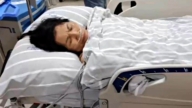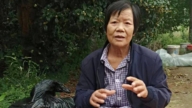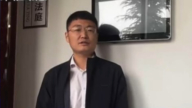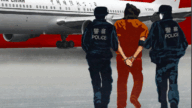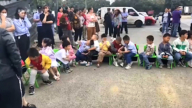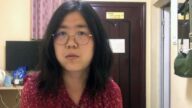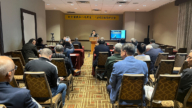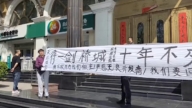【新唐人2014年01月17日訊】中共「中央民族大學」、新疆維吾爾族教師伊力哈木•土赫提,星期三下午被警方從北京的寓所帶走,但原因不明。來自新疆的消息指出,自中共高層最近重新研究和部署新疆問題後,整個新疆的維穩再次升級,維吾爾人生存環境進一步惡化。
1月15號下午3點半左右,維吾爾學者伊力哈木•土赫提,被警察從家中帶走,伊力哈木的母親也失去音訊。
當晚9點半多,伊力哈木妻子古再努爾給藏族作家唯色打來電話說,下午約4點多,她從外面回家時,發現三、四十個警察聚集在她家中,搜查各個角落。
直到晚上9點多,警察才離開,並把她家中的4臺電腦、3個手機、活動硬盤、優盤,以及伊力哈木上課的教案、和裝有證件、銀行卡的小保險櫃都抄走了。
與此同時,部分「中央民族大學」的維吾爾學生,也被叫到各自所在的學院,具體原因不明。
家住新疆的大陸《權利運動》組織發起人胡軍分析,伊力哈木被抓,與最近中共當局重新研究和部署新疆問題有關。他表示,目前整個新疆的維穩再次升級。
大陸《權利運動》組織發起人 胡軍:「我這個地方已加崗了,我的門外樓裡,停著麵包警車還有小轎車,最近加崗了,習近平發表講話時候,國保也到我這來了,就是說關於新疆的問題不要談,警告說再談送我到監獄。」
去年12月19號,中共政治局7名常委,專門開會聽取了新疆工作匯報,研究和部署當前和今後一個時期的新疆工作。中共總書記習近平在會上指出,社會穩定和長治久安是新疆工作的「首要任務」。
會議結束的第二天,新疆自治區黨委書記張春賢立即趕回了烏魯木齊,半個月內接連召開了6次新疆高層會議,通報會議中有關新疆工作的情況。
「中央民族大學」哲學與宗教學系教授趙士林指出,當局對「民族自治權」,應該進一步落實,應該對過去的民族政策有所反省。
「中央民族大學」哲學與宗教學系教授 趙士林:「硬性的彈壓,在現代社會既不符合文明原則,同時也不能達到穩定的目地,還是要懷柔、還是要尊重人家,尊重人家的文化,尊重人家的經濟和政治權利,否則的話也是大麻煩。」
繼2009年新疆「7.5事件」以來,涉及新疆的衝突事件頻頻見諸報端,僅去年,就有數十起大型流血衝突。去年6月25號,發生在吐魯番地區鄯善縣魯克沁鎮的衝突,有27人死亡,是中共當局公布死亡人數最多的一次。
而去年10月28號,發生在北京天安門金水橋的汽車衝撞事件,震驚國際。這一家3口以性命製造的流血事件,再次喚醒了世人對維吾爾人人權的關注。而每一次的流血事件,都被中共定性為「恐怖襲擊」。
總部設在德國慕尼黑的「世界維吾爾大會」,發言人迪裡夏提指出,新疆衝突事件接二連三爆發,直接跟中共當局在新疆施行的高壓政策有關。
「世界維吾爾大會」發言人迪裡夏提:「維吾爾人已經到了深層危機的極限,而且當局任意的扣押,任意的清查,任意闖入維吾爾人的家中,以所謂維穩的名義,對維吾爾人傳統的生活方式、信仰挑釁,而引發了一系列衝突。」
迪裡夏提指出,不管發生甚麼樣的衝突,中共都會在當地採取軍事鎮壓,然後對外宣稱,他們打擊了所謂的恐怖組織,恐怖份子。
迪裡夏提:「如果中國政府不更改目前推行的政策,繼續採取歧視性挑釁政策的話,只會導致局勢進一步惡化,衝突進一步擴大,為了避免局勢進一步惡化,和新一輪動盪的出現,我認為中國必須立刻停止目前對維吾爾人所採取的系統性迫害。」
迪裡夏提還呼籲國際社會向中共當局發出更有效和強有力的信息,讓中共停止在新疆的現行高壓政策。
採訪編輯/李韻 後製/李勇
Xinjiang Uyghur Representative Ilham Abducted from Home
Minzu University of China Professor Ilham Tohti,
a member of the Uyghur ethnic minority, was abducted
by the police on Wednesday afternoon from his Beijing home
for reasons unknown.
Sources in Xinjiang note that the livelihood of Uyghurs
has further deteriorated due to the escalating
stability maintenance after the central government’s
new deployment to Xinjiang.
At 3:30 p.m. on Jan. 15th, Uyghur Professor Ilham Tohti
was taken away from his home by police.
lham’s mother also went missing.
That evening, in a phone conversation with Tibetan poet
Woeser, Ilham’s wife Guzaili Nu’er said that when she
arrived home around 4 p.m., 40 police were in the process
of raiding her home.
The police did not leave until 9 p.m.
They confiscated four computers, three cell phones,
hard drives, USB flash drives, and discs.
They also seized Ilham’s class materials as well as
a small safe with documents and bank cards.
At the same time, for reasons not specified, a portion
of Uyghur students at the University were also summoned
to their respective departments.
Human Rights Campaign organizer Hu Jun believes Ilham’s
detainment was related to the recent deployment of Chinese
authorities to Xinjiang by the central government.
Hu Jun, who is also a resident of Xinjiang, says the regime
has further tightened the stability maintenance in Xinjiang.
Hu Jun, Human Rights Campaign organizer: “Patrol has been
enhanced in my area.
There are police cars surrounding my apartment.
When Xi Jinping was delivering a speech, state security
visited me and warned me not to talk about the Xinjiang issue
or else I would be sent to jail."
Just this past Dec. 19, seven Central Politburo Standing
Committee members held a meeting regarding a report
about current and future deployment to Xinjiang.
Xi Jinping also ordered that stability be made
“top priority" in Xinjiang.
Immediately after the meeting, Xinjiang Autonomous Region
Party Secretary Zhang Cunxian conducted six local high-level
meetings in two weeks to discuss the central government’s
decision regarding Xinjiang.
Zhao Shilin, School of Philosophy and Religious Studies
professor at Minzu University of China criticizes
the regime’s inability to reflect the ethnic policy
and implement the so-called autonomy.
Zhao Shilin, Professor of Philosophy and Religious Studies:
“This rigid repression in modern society is inconsistent
with the principles of civilization and won’t reach its goal
of a stable society.
They ought to adopt the policy for stabilization through
conciliation with respect of the differences in culture,
economy and politics.
Otherwise, trouble will continue."
Since the July 2009 Ürümqi riots, there have been
numerous reports of conflict in Xinjiang.
Last year, there were dozens of large-scale bloodbaths.
For example, a conflict in the Turpan area on June 25
resulted in 27 fatalities, the largest death toll the regime
has announced.
The shocking car crash in Tiananmen Square on Oct. 28
which claimed the lives of a family of three once again
called the world’s attention to human rights issues involving
Uyghurs in China.
The Communist regime has routinely classified
these bloodsheds as “terrorist attacks."
Dilshat Reshit, a spokesman for the Munich-based World
Uyghur Congress, points out that the sequential clashes
are related to the regime’s high-handed policy
in regards to Xinjiang.
Dilshat Reshit, spokesman for World Uyghur Congress:
“What the Uyghurs have experienced has reached
the limit of deep crisis.
The arbitrary detainment, interrogation and home invasions
in the name of stability maintenance is a provocation
to the traditions and beliefs of the Uyghurs.
That’s what has triggered a series of conflicts."
Dilshat Reshit indicates that regardless of the type of conflict,
the regime will only deploy a local military suppression and
subsequently announced to the world that they have tackled
the issue of so-called terrorist organizations and terrorists.
Dilshat Reshit: “If the Communist regime continues
its current policy of discrimination and provocation,
the situation will only further deteriorate and the conflict
will grow.
The regime must immediately stop the systematic persecution
of Uyghurs to avoid further deterioration and the emergence
of a new round of turmoil."
Dilshat Reshit also calls on the international community
to send a more effective and powerful message to the regime
to terminate the current repressive policies in Xinjiang.
Interview & Edit/LiYong


